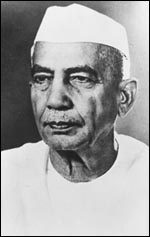Kisan Diwas | 24 Dec 2022
For Prelims: Kisan Diwas, National Farmers Day, Chaudhary Charan Singh, Initiatives for Farmers
For Mains: Government Policies & Interventions, Schemes related to Farmers
Why in News?
As many as 13 farmers known for innovative farming were felicitated to mark Kisan Diwas or National Farmers Day on 23rd December, 2022.
- The Kisan Diwas is observed across the country to celebrate the birth anniversary of Chaudhary Charan Singh, the former Prime Minister of India.
What are the Key Facts about Chaudhary Charan Singh?
- He was born in 1902 at Noorpur in Meerut district of Uttar Pradesh and was the Prime Minister of India from 28th July 1979 to 14th January 1980.
- Being a proponent of rural and agricultural development, he made continuous efforts for keeping agriculture at the centre of planning for India.
- He was given the nickname ‘Champion of India’s Peasants’ for his work towards upliftment of farmers and development of agriculture throughout the country.
- He took a leading part in formulation and finalisation of the Debt Redemption Bill 1939, in order to give relief to the peasantry from moneylenders.
- He was instrumental in bringing about the Land Holding Act, 1960 which was aimed at lowering the ceiling on land holdings to make it uniform throughout the Uttar Pradesh.
- He left Congress in 1967 and formed his independent party known as the Bharatiya Lok Dal.
- He served twice as Chief Minister of Uttar Pradesh. He became Prime Minister of India in 1979.
- He was the author of several books and pamphlets, including ‘Abolition of Zamindari’, ‘Co-operative Farming X-rayed’, ‘India’s Poverty and its Solution’, ‘Peasant Proprietorship or Land to the Workers’ and ‘Prevention of Division of Holdings Below a Certain Minimum’.
What are the Related Initiatives for Farmers?
- PM-KISAN: Under the scheme, the Centre transfers an amount of Rs 6,000 per year, in three equal instalments, directly into the bank accounts of all landholding farmers irrespective of the size of their land holdings.
- National Mission for Sustainable Agriculture: It aims at promoting sustainable agriculture practices best suitable to the specific agro-ecology.
- Pradhan Mantri Krishi Sinchayee Yojana: It has three main components namely Accelerated Irrigation Benefit Programme (AIBP), Har Khet ko Pani (HKKP), and watershed development components.
- Rashtriya Krishi Vikas Yojana (RKVY): It was initiated in 2007, and allowed states to choose their own agriculture and allied sector development activities as per the district/state agriculture plan.
- Nutrient Based Subsidy (NBS) Programme: Under this programme, fertilizers are provided to the farmers at the subsidized rates based on the nutrients (N, P, K & S) contained in these fertilizers.
- Rashtriya Gokul Mission: It is being implemented for development and conservation of indigenous bovine breeds since December 2014.
- Pradhan Mantri Fasal Bima Yojana: It provides a comprehensive insurance cover against failure of the crop thus helping in stabilising the income of the farmers.
- Paramparagat Krishi Vikas Yojana: Launched in 2015, it is an elaborated component of Soil Health Management (SHM) of major project National Mission of Sustainable Agriculture (NMSA).
- Kisan Credit Card : The scheme was introduced in 1998 for providing adequate and timely credit support from the banking system, under a single window with flexible and simplified procedure to the farmers.
UPSC Civil Services Examination, Previous Year Questions (PYQs)
Q1. Under the Kisan Credit Card scheme, short-term credit support is given to farmers for which of the following purposes? (2020)
- Working capital for maintenance of farm assets
- Purchase of combine harvesters, tractors and mini trucks
- Consumption requirements of farm households
- Post-harvest expenses
- Construction of family house and setting up of village cold storage facility
Select the correct answer using the code given below:
(a) 1, 2 and 5 only
(b) 1, 3 and 4 only
(c) 2, 3, 4 and 5 only
(d) 1, 2, 3, 4 and 5
Ans: (b)
Exp:
- The Kisan Credit Card (KCC) scheme was introduced in 1998 for providing adequate and timely credit support from the banking system under a single window with flexible and simplified procedure to the farmers for their cultivation and other needs like purchase of agriculture inputs such as seeds, fertilizers, pesticides etc. and draw cash for their production needs.The scheme was further extended in the year 2004 for the investment credit requirement of farmers viz allied and non-farm activities.
- Kisan Credit Card is provided with the following objectives:
- The short term credit requirements for cultivation of crops,
- Post harvest expenses, hence 4 is correct.
- Produce marketing loan,
- Consumption requirements of farmer household, hence 3 is correct.
- Working capital for maintenance of farm assets and activities allied to agriculture, like dairy animals, inland fishery, etc., hence, 1 is correct.
- Investment credit requirement for agriculture and allied activities like pumpsets, sprayers, dairy animals, etc. However, this segment forms the long term credit limit portion.
- The Kisan Credit Card Scheme is implemented by Commercial Banks, RRBs, Small Finance Banks and Cooperatives.
- The short-term credit support is not given to farmers for Purchase of combine harvesters, tractors and mini trucks and Construction of family house and setting up of village cold storage facility. Hence, 2 and 5 are not correct.
- Therefore, option (b) is the correct answer.
Q2. With reference to ‘Pradhan Mantri Fasal Bima Yojana’, consider the following statements: (2016)
- Under this scheme, farmers will have to pay a uniform premium of two percent for any crop they cultivate in any season of the year.
- This scheme covers post-harvest losses arising out of cyclones and unseasonal rains.
Which of the statements given above is/are correct?
(a) 1 only
(b) 2 only
(c) oth 1 and 2
(d) Neither 1 nor 2
Ans: (b)

